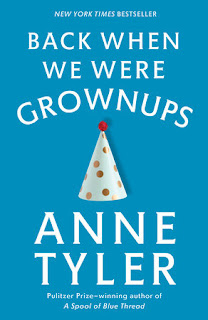/CASTELLANO DEBAJO/
In February, at our monthly Reading Club meeting in Ermua, we talked about Anne Tyler's Back When We Were Grownups and one more time I was impressed by how prolific and easy to read this author is. Her writing style seems to be effortless, natural and the dialogs are totally beleviable in all her novels that I have read.
En febrero, en nuestra reunión mensual del club de lectura en inglés en Ermua, hablamos sobre Cuando éramos mayores de Anne Tyler y una vez más me impresionó lo prolífica y fácil de leer que es esta autora. Su estilo de escritura parece ser logrado sin esfuerzo, natural y los diálogos son totalmente creíbles en todas sus novelas que he leído.Back When We Were Grownups is not an exception. It's a 2001 novel written by Anne Tyler in memory of her husband, who died in 1997. It's also her 15th novel, set in Baltimore, Maryland like most of her work. It opens with the sentence, "Once upon a time, there was a woman who discovered she had turned into the wrong person." The woman in question is Rebecca Davitch, a 53-year-old widow, mother, grandmother, and proprietor of a party and catering business run from her home called Open Arms. Tyler said in one of the interviews that she wanted the book to be full of joy and celebration but without forgetting the sense of loss one feels when grieving. I think she has achieved it on the surface, but, in some way, the story left me with a bitter-sweet feeling. Overall, I felt more sadness than happiness. Don't get me wrong, I enjoyed it a lot, but I couldn't help but feel for Rebecca.
She is a wonderful, mature and complex character and those around her don't seem to appreciate all she has done and is still doing for them. Her stepdaughters take her for granted, forgetting all she had to sacrifice and face when she was left alone with them as a young widow. Too modest to give herself merit for all she carries on with all the burdens of her late husband's family. I found it heartbreaking. It's true that the ending in some way is full of hope, the author suggested in some interviews that Rebecca's future is bright. Or at least brighter. I'm glad she said it, as I was imagining a completely different thing... My natural pessimism, I guess.
I imagine you have already realised it's not a book full of action, run by a thick plot. It's a character's story when we see one person's life in detail and see how they react to it, how they assume the changes and who they become along the way. I enjoyed it, but if you are a kind of person who prefers lots of plot twist and crazy events, this book might be not for you.














Comentarios
Publicar un comentario